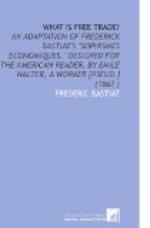CHAPTER XIX.
NATIONAL INDEPENDENCE.
Among the arguments which are considered of weight in favor of the restriction system, we must not forget that drawn from national independence.
“What shall we do in case of war,” say they, “if we have placed ourselves at the mercy of Great Britain for iron and coal?”
English monopolists did not fail on their side to exclaim, when the corn-laws were repealed, “What will become of Great Britain in time of war if she depends on the United States for food?”
One thing they fail to observe: it is that this sort of dependence, which results from exchange, from commercial operations, is a reciprocal dependence. We cannot depend on the foreigner unless the foreigner depends on us. This is the very essence of society. We do not place ourselves in a state of independence by breaking natural relations, but in a state of isolation.
Remark also: we isolate ourselves in the anticipation of war; but the very act of isolation is the commencement of war. It renders it more easy, less burdensome, therefore less unpopular. Let nations become permanent recipient customers each of the other, let the interruption of their relations inflict upon them the double suffering of privation and surfeit, and they will no longer require the powerful navies which ruin them, the great armies which crush them; the peace of the world will no longer be compromised by the caprice of a Napoleon or of a Bismarck, and war will disappear through lack of aliment, resources, motive, pretext, and popular sympathy.
We know well that we shall be reproached (in the cant of the day) for proposing interest, vile and prosaic interest, as a foundation for the fraternity of nations. It would be preferred that it should have its foundation in charity, in love, even in self-renunciation, and that, demolishing the material comfort of man, it should have the merit of a generous sacrifice.
When shall we have done with such puerile talk? When shall we banish charlatanry from science? When shall we cease to manifest this disgusting contradiction between our writings and our conduct? We hoot at and spit upon interest, that is to say, the useful, the right (for to say that all nations are interested in a thing, is to say that that thing is good in itself), as if interest were not the necessary, eternal, indestructible instrument to which Providence has intrusted human perfectibility. Would not one suppose us all angels of disinterestedness? And is it supposed that the public does not see with disgust that this affected language blackens precisely those pages for which it is compelled to pay highest? Affectation is truly the malady of this age.




